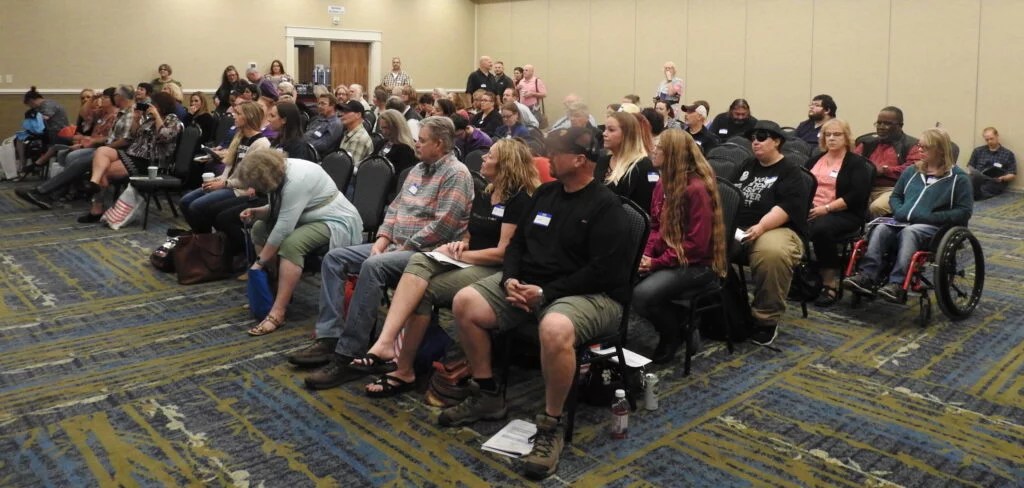We are a network of individuals who are on the path of recovery.
We identify as being in recovery from mental health, substance abuse and or addiction struggles. Together we share information, provide peer support, advocate with a united voice and improve the system. We come from places all across Montana, with different stories and experiences but together we make a difference. This is the Recovery Movement in Montana.


Realizing Recovery Blog
An Avoidable Tragedy in Montana
When I first got involved with mental health advocacy in 2009, we were urging the legislature to address the broken mental health system. In 2025 advocates are still urging the legislature to address the broken mental health system in Montana. Back then we had funding for a community-based crisis system. We had twice as many crisis beds available, and we had a psychiatric hospital that encouraged and promoted mental health recovery. Today we do not have sustainable funding for statewide crisis services, we have less crisis beds, and we do not follow national standards for Montana State Hospital or for crisis response in Montana. In 2022 Montana lost its federal funding for Montana State Hospital because it repeatedly failed to meet minimum federal standards for health and safety. I would also include the increase in unhoused individuals in nearly every community in our state, many of whom have a mental health diagnosis.
Societal Issues Affecting Mental Health
It is hard to not see suffering on a daily basis around the world, in the United States and here in Montana. When I tune in for my daily dose of news, I am often struck by the lack of awareness around mental health related issues. For example, in Texas where the extreme flooding occurred there is virtually no reporting on mental health counseling, or peer support for the massive amount of grief and loss that is taking place. In the nearly weekly reporting of mass shootings at places of work, schools and in our communities across the nation, we fail to address mental health needs.
Chronic Disease Awareness Day
Managing the physical, mental, and emotional toll of chronic diseases can be isolating for both the individual and their family. As people in recovery and parents/caregivers of children with special healthcare needs including behavioral health, we know firsthand the feelings of frustration, isolation, despair, and hopelessness. We know the challenges of finding treatment and advocating to be heard. We know the hope in finding joy and meaning living with chronic health conditions.
Intersectionality
Millions of people are affected by mental health issues and LGBTQIA+ youth and adults are especially affected. For example, the CDC reports that nearly 48% of LGBTQIA+ youth seriously considered suicide in the past year as compared to their non LGBTQIA+ counterparts. 39% of LGBTQIA+ adults rate their mental health as “fair” or “poor” while 16% of non LGBTQIA+ adult report the same. These disparities are often due to lack of support, discrimination, social rejection, and difficulty accessing care. Being LGBTQIA+ is not the risk factor in itself, the discrimination these people experience is.
Embracing Every Form of Resiliency
May is Mental Health Awareness Month, and for me, as someone who walks this path not only for myself but alongside others as a peer and family peer supporter, it’s more than just a calendar observance. It’s a heartfelt invitation. It’s a chance to shine a light on mental well-being, reduce stigma, and encourage real, meaningful conversations about what it means to live with, and rise through, mental health challenges.
But beyond awareness, this month is also a celebration of something that’s often overlooked in clinical discussions: resilience. Real-life, hard-earned, deeply human resilience. I see it every day. In my own life, in the families I support, and in the courageous individuals I walk beside. In a world that constantly demands more, the ability to care for ourselves and each other, to bounce back, to try again, that’s nothing short of heroic in my eyes.
Awareness into Action
Reposted from Mental Health America’s Mental Health Month 2025 Planning Guide While one in five people experience a mental health condition each year, every single one of us has a mind to take care of. Furthermore, mental health is not just a personal issue—it’s a societal one. And the need for action has never been greater.This…
Mental Health Services Uncertain
May is Mental Health Awareness Month. At least for now. I say that because with all of the federal changes one never knows. What the Department of Government Efficiency will deem inefficient is anyone’s guess. May was first established as mental health awareness month in 1949 by Mental Health America (https://mhanational.org/) the oldest mental health advocacy organization in the United States. You can take a number of mental health screenings for free on their website. They also have resources for further support. Now more than ever mental health advocates need to work to bring awareness to the importance of mental wellbeing.
Daylight Savings Time, More Than Changing Our Clocks
March is daylight savings time when we turn our clocks ahead and gain an extra hour of daylight in the evenings. People look forward to this day all winter. But for some this change can be hard. Turning our clocks ahead means getting up in the dark. It takes our bodies time to adjust to losing an hour of sleep and getting up an hour earlier. Daylight savings time has caused me to think about change in general and how there are always upsides and downsides to change.
The Power of Kindness
Acts of kindness are often seen as simple gestures, yet their impact on mental health can be profound. Whether it’s offering a smile to a stranger, helping a coworker, or volunteering for a cause, kindness can create a ripple effect that benefits both the giver and the recipient. Research has consistently shown that engaging in acts of kindness boosts mental well-being, reducing stress, increasing happiness, and fostering a sense of belonging.
“Creating safe places creates a healing culture!”
I write this blog for the first annual Substance Use Disorder Treatment Month (Treatment Month). SAMHSA recently announced that January 2025 would be the launch of Treatment Month. According to SAMHSA “this serves to support: people contemplating or seeking help for substance use, practitioners treating or considering treating substance use disorder, friends, family and loved ones of people with substance use conditions; by raising awareness of treatment. SAMHSA seeks to: eliminate stigma surrounding treatment, including medications used to treat substance use disorders, encourage those on their treatment and recovery journey, and promote best practices such as screening, intervention, and treatment of substance use disorders by health care professionals.
Advocacy
Check out our new page dedicated to tracking state and federal bills, executive orders, and lawsuits.
 Standing up for what we believe is right, having a voice, making choices in recovery, and sharing our own recovery story are some of the things that make up advocacy and self-advocacy.
Standing up for what we believe is right, having a voice, making choices in recovery, and sharing our own recovery story are some of the things that make up advocacy and self-advocacy.
Let’s start with self-advocacy which refers to an individual’s ability to effectively communicate, convey, negotiate, or assert his/her own interests, desires, needs, or rights. It involves making informed decisions and taking responsibility for those decisions (Van Reusen et al., 1994).
Knowing yourself and your strengths, needs, and interests is the first step toward advocating for your rights. Once we begin to find our way on the path of recovery, we may want to begin to advocate for ourselves with those around us—peer supporters, friends, family, service providers, and doctors. These conversations may be difficult, but having them is vital to your recovery. Remember, you are the expert on yourself.
It may be that prior to getting on the path to recovery, others were making decisions for you or acting in what they believed to be your best interest. Now may be the time for you to let others know what you believe to be in your best interest. You may find yourself in the process of taking control and making decisions affecting your life and perhaps others’ lives. This process of self-determination means making informed choices, problem solving, setting and attaining goals—essentially being a self-advocate.
Advocacy or advocating for others may be something you are interested in doing. Advocating for another person isn’t about acting in a person’s perceived best interest, but it is standing with a person to ensure they are able to articulate and obtain what they want or need. Perhaps you may consider speaking up and advocating for various changes in the services in your community.
Here are a few examples of advocacy:
- Speak to your legislature or a special committee.
- Get involved with an advocacy group or organization.
- Share your recovery story to support others in recovery.
- Whether advocating for yourself, for others, for your community, or as part of an organization, advocacy is very self-empowering. You can make a real difference in your life, the lives of others, and even the community.
- Reach out to Montana’s Peer Network and share your recovery story on one of our “Recovery Talks” podcasts.
Advancing Advocacy Blog
The Ripple Effect of Kindness
As we navigate the challenges of today’s world, from political tensions to economic struggles, it’s easy to forget that the most essential part of our humanity is a simple act of kindness. On Be Kind to Humankind Week, we are gifted an opportunity not only to reflect on the value of kindness but to practice and advocate for it in our everyday lives consistently. As someone who wears multiple hats, from a peer supporter role to an advocate for social change, this week holds deeper significance.
An Avoidable Tragedy in Montana
When I first got involved with mental health advocacy in 2009, we were urging the legislature to address the broken mental health system. In 2025 advocates are still urging the legislature to address the broken mental health system in Montana. Back then we had funding for a community-based crisis system. We had twice as many crisis beds available, and we had a psychiatric hospital that encouraged and promoted mental health recovery. Today we do not have sustainable funding for statewide crisis services, we have less crisis beds, and we do not follow national standards for Montana State Hospital or for crisis response in Montana. In 2022 Montana lost its federal funding for Montana State Hospital because it repeatedly failed to meet minimum federal standards for health and safety. I would also include the increase in unhoused individuals in nearly every community in our state, many of whom have a mental health diagnosis.



